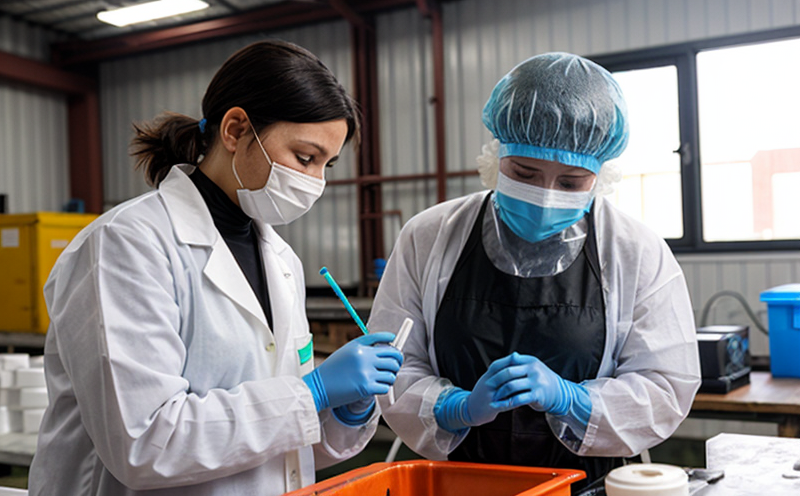ASTM E1131 Thermal Stability Analysis of Recycled Nanomaterials
The ASTM E1131 method is a cornerstone in the evaluation of thermal stability for nanomaterials. This service provides comprehensive analysis tailored to recycled nanomaterials, ensuring compliance with international standards and supporting product quality assurance.
Thermal stability refers to how well materials can withstand high temperatures without degrading or losing structural integrity. In the context of nanomaterials, this is critical for applications ranging from electronics to construction. For recycled nanomaterials, understanding thermal stability ensures that these materials are suitable for reintegration into new products.
The ASTM E1131 test involves heating a sample at a controlled rate and monitoring its weight loss or changes in other physical properties as temperature increases. This allows us to identify the temperature at which significant decomposition begins, known as the onset of degradation (ODT).
For recycled nanomaterials, this analysis is essential for several reasons:
- Determining the optimal processing conditions.
- Ensuring product quality and consistency.
- Avoiding unintended chemical reactions that could affect performance.
The test can also help in optimizing the recycling process, ensuring that recycled nanomaterials are as stable and reliable as their virgin counterparts.
In the context of recycled nanomaterials, ASTM E1131 is particularly important because it allows us to assess not just the physical properties but also the environmental impact. By understanding how these materials behave under heat, we can better manage waste streams and reduce the carbon footprint associated with their production.
The test results are crucial for product development in sectors such as electronics, where nanomaterials play a key role in improving performance and reducing weight. In construction, recycled nanomaterials offer sustainable solutions that meet stringent quality standards.
Our laboratory uses state-of-the-art equipment to perform ASTM E1131 tests with precision and accuracy. This ensures reliable data that can be used for regulatory compliance and internal quality control.
Scope and Methodology
| Aspect | Description |
|---|---|
| Sample Preparation | The sample is typically a small quantity of the recycled nanomaterial, prepared in a manner that ensures uniformity and reproducibility. |
| Instrumentation | We use Differential Scanning Calorimeter (DSC) and Thermogravimetric Analysis (TGA) instruments to measure thermal stability. The DSC is used for monitoring heat flow, while TGA measures mass changes. |
| Test Parameters | The sample is heated at a controlled rate, typically 10°C/min, and the temperature range is set according to ASTM E1131 standards. |
| Data Analysis | Data analysis involves identifying the onset of degradation (ODT) and calculating weight loss percentages at various temperatures. |
The results from this test are critical for ensuring that recycled nanomaterials meet stringent quality standards. They help in optimizing the recycling process, improving product performance, and enhancing sustainability efforts.
Why Choose This Test
- Precision: ASTM E1131 provides precise data on thermal stability, ensuring accurate assessments of recycled nanomaterials.
- Regulatory Compliance: Ensures compliance with international standards such as ASTM and ISO.
- Quality Assurance: Helps in maintaining high product quality by identifying any potential issues early in the development process.
- Sustainability: Supports sustainable practices by ensuring that recycled materials are stable and reliable.
- Optimization: Allows for the optimization of recycling processes, leading to more efficient and effective use of resources.
The test is essential for industries such as electronics and construction, where nanomaterials play a critical role. By choosing this service, you ensure that your recycled nanomaterials are fit for purpose and can be used in high-quality products.
Competitive Advantage and Market Impact
The ASTM E1131 test provides a significant competitive advantage by ensuring that your recycled nanomaterials meet the highest quality standards. This not only enhances product reliability but also differentiates your offerings in the market.
By demonstrating compliance with international standards, you can build trust and credibility with customers, which is crucial for establishing long-term relationships. The test results can be used to promote sustainable practices, appealing to environmentally conscious consumers.
The data from this test can help in optimizing product development processes, leading to faster time-to-market and lower production costs. This competitive edge can translate into higher market share and better customer satisfaction.





